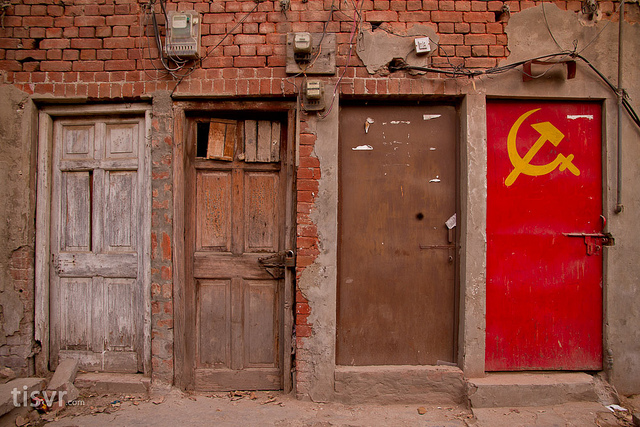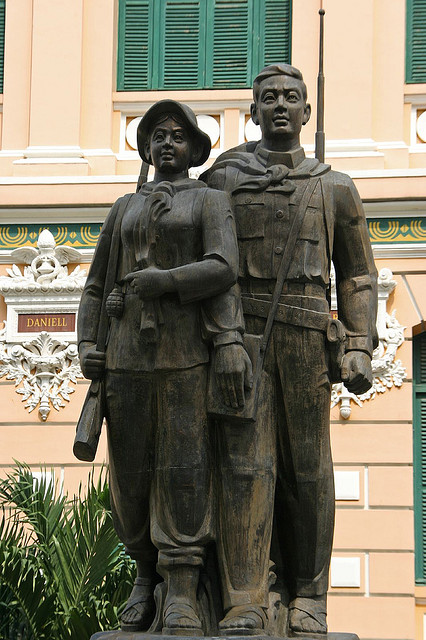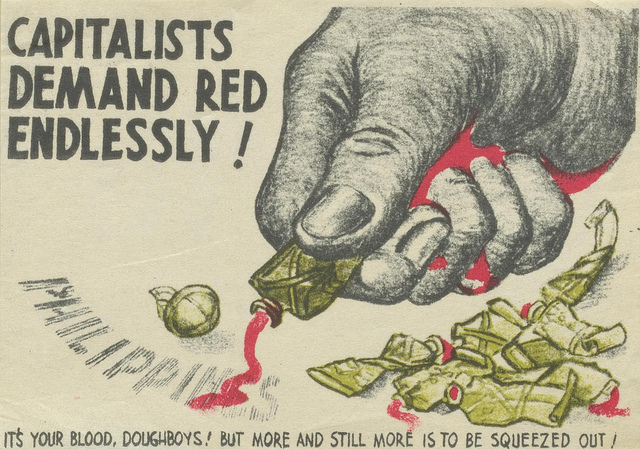|
|||||||||||||
The Philosopher Between the Capitalist and the Communist Chapter 8 : When Different Worlds Meet By Punkerslut
"Greetings!" the Anarcho-Communist said to the Anarcho-Capitalist. "Hello there!" the Anarcho-Capitalist replied. "Where are you heading to? I have not seen a soul in about a day." "My destination is always changing as soon as I realize that there might be somewhere different and better. I have no real destination, but I'm heading for Ankara. Where are you going?" "I understand that there's a beautiful lake that I cannot miss in this direction. I'm Emma, what's your name?" "Emma? Do you mean the Emma, the Anarcho-Communist?" "Yes, of course, that is me." "I'm Benjamin, the Anarcho-Capitalist! I have heard of you -- I know the stories." "I hope they're good stories about community sharing." "I remember one about piracy." "And I've heard stories about you -- I heard you mugged an old man who did nothing more than simply knock on your front door." "Goddamned tax collectors!" "You're an Anarchist, just like I am, but there's still a lot between us that is so extremely, extremely different." "You made your home in Athens, I in Babylon. We have very different parents, so of course we're going to have very different customs." "Heritage is so difficult to shake off. Are we more Anarchists, one and the same, or are we more economic enemies, one Communist the other Capitalist?" "You know that's not just the only difference between us. Capitalism is about independence and individualism, Communism is about being addicted to the commune." "You're addicted to religion!" "And you're addicted to philosophy!" "You're terrified of new and different people moving in next to you just because they're from someplace that you can't sympathize with." "And you welcome them all on in, each and every one of them, limiting your personal space more and more, until what was once a quiet and calm forest full of creatures is nothing but a deserted, desolated desert, only populated by tremendous buildings and empty minded crowds." "You believe that individualism means owning lots of property that you can keep people off of except when you hire them to work it at starvation wages." "You believe that individualism means being able to choose whether to work the morning shift or the afternoon at the community-owned iron mine." "You throw yourselves against each other in ritual cutting ceremonies at your temples, like a cult organization that tries to dominate and control every member in a hierarchical manner." "You throw yourselves against each other in free love, sex orgies, inducing any and every drug you can find to lull or excite the senses, and then praising your destroyed bodies as proof of individualist accomplishment." "You Capitalists never stop praising the peasant, the backward, conservative force of society that has always resisted social change, upheld sexism and racism, and defended the government any time it was threatened." "And you Communists never stop praising the proletariat, the simple-minded, eight-to-twelve hours-a-day worker at the office, factory, or mine, whose only thoughts are either how to forget life through luxury or how to dominate fellow co-workers." "You love national distinctions, to the exclusion of all other distinctions, and it never matters if a human being can feel like you, if only they look like you, have an accent like you, or dress like you." "You despise any sense of localism, smashing the independent identity that self-ruling villages and communities have built up over centuries against the grueling oppression of empires trying to conquer them." "You praise the secrecy and intrigue of families, the selling of daughters, the domination of the father over the family, the abuse and neglect of children under the guise of letting everyone run their own family, and the exclusion of individuals without family from all social life."
"You perceive every form of social organization as a threat to the individual!" "And you completely ignore how little liberty is left to the individual after any such complex, organized, social organization!" "You would let Satan rape the world if it meant that each person could own their own piece of land." "You would be his summoner once you have established a society where every individual choice is determined by the community." She looked at him, her wild hair reflecting the state of her mind, and he looked right back at her, his unflinching eyes representing his boldness of thought. They conversed like sword fighters trying to kill each other, bearing teeth not so much to make the noises necessary for the words as to express rage and anger. Emma and Benjamin then both opened their mouths at the same time to scream, but something stopped them. Their eyes turned from bold brazenness to furled squinting, their minds turning from rage to curiosity. "... you hear that, don't you?" ~ "Of course I hear it!" And then, the sound finally became more identifiable, as it slowly approached. "Doot doot doot, mmmm -- doot doot -- doot doot -- doot doot doooo...." Someone was singing. "Mmmmm, doot doot doooo....." With the two Anarchists in deep suspense, they both noticed as just over a nearby hill, there popped up an indescribable man with robe and cane. "Doot doot -- doot doot -- doooo...." "Oh, it seems I have run into company," the man said, as he stopped in his tracks, "Pardon me, but I am the Philosopher." "Good to meet you," Emma said, "I have heard so much about you. I'm Emma, the Anarcho-Communist." "And I, too, have heard much about your adventures. I'm Benjamin, the Anarcho-Capitalist." The Philosopher replied, "Ah, that is why I heard so much noise in this direction. I thought I had heard a small boy torturing a pig or something, but no, apparently I was only listening to a Communist and a Capitalist argue with each other." Emma said, "Olmo! You must know that discourse is needed if you want to find out the truth." "Please, don't call me that!" the Philosopher replied, "And the only discourse you need to find truth is going to be between one part of the brain and the other -- the mouth need not enter into it." "I apologize," Emma replied, "Solon told everyone in Athens that you had abandoned the name the Philosopher, and had taken up the new name, 'Olmo'." "Yes, I heard that rumor," the philosopher replied, "I never tried to correct it, because anyone who knows me well enough would know that it's just a muse of the king and not anything resembling truth." "Interesting to hear," Benjamin said, "Hammurabi had told everyone that your new name was Amin, and he even said that you threatened people with death if they had called you anything but that." "Lies, lies, and more lies!" the philosopher rejoined, "This makes me think that we should abandon the tradition of letting other people name us altogether! Call me anything you like, but if anyone's listening when you talk, then by all means, avoid any confusion and just call me the Philosopher. It's who I am." "I've grown tired of hearing that oaf Hammurabi lecture us on how to live," Benjamin replied, "And he wasn't even right." "Anyone who is telling you how to live is probably not right, especially if they stand to gain anything out of it," the Philosopher replied. "So disobey everyone whenever they're trying to control you?" Emma said, "You sound like you're an Anarchist, Philosopher!" "I only talk about what I know," the Philosopher replied, "I let others generalize. What issue was so important that we could hear you clamoring on about it down at the fire pit on the other side of the lake?" "You're the ones who started the fire pit?" Benjamin said. "Well," the Philosopher began, "I ran into some relatively tolerant and interesting people, and we decided to talk, to drink, to burn things, to inhale some of the things we burn, and the like -- until we were horribly disturbed by some argument in this direction. So, I came up around here abouts. Everyone else at the fire pit was too paranoid to check it out. But I always like a good adventure. Anything to soothe my curiosity." "What are you curious about?" Benjamin asked. The Philosopher said, "The damned noise that you think passes for conversation. What are you arguing about?" "We are fundamentally different people, realizing that we look at the world in fundamentally different ways," Emma said, "Notwithstanding the fact that his view of looking at the world is wrong." "Mine? Perhaps it is yours that is simply too narrow to capture everyone's feeling and thought," Benjamin said.
The Philosopher spoke, "This? This is why you disturbed the robins and blue jays that we were watching just beyond our camping spot? This is why I had to leave behind a pipe and a bottle and a source of warmth? So you could gas on and on about how Communists are better or how Capitalists are better? Is that it?" There was no reply. "The robin and blue jay can sit on the same branch, because they're both just birds, and they don't have to claw each other's eyes out for having different colored feathers -- the one red and the other blue." Emma and Benjamin looked at each other. "What do you each want?" the philosopher demanded. "You know what we want," Emma replied, "I want an Anarcho-Communist society, and he wants an Anarcho-Capitalist society." "But why do you want them?" "It should be obvious why anyone would want an Anarcho-Capitalist society," Benjamin replied, "Because it best guarantees individual liberty, when anyone can own property, and it provides a social way of life where each person is sustained and, at the same time, independent from the others." "And why do you want an Anarcho-Communist society?" "For all of the reasons that civilization was founded to begin with," Emma responded, "An Anarchist society, where everyone can join or part with any organization they like, whether it's a workplace, community, or family unit, best provides for individual liberty, and Communism, where everyone own the tools they work with, absolutely provides best for personal, human necessity." "You, Benjamin," the Philosopher interjected, "Why do you want to guarantee individual liberty? Why do you want each person to be sustained?" "Obviously, each person should have liberty and sustenance, because they are each essential to individual happiness." "You, Emma," the Philosopher spoke, "Why do you want to provide for individual liberty? Why should everyone be provided with personal, human necessities?" "You know my thoughts on that, you have to," Emma replied, "Because it best contributes to human happiness. Without either liberty, or the nourishment of life, there is no such thing as happiness -- there is no such thing as peace of the soul." "You, Cappie -- tell me this," the Philosopher's tone became less indicting and more companion-like, "What is the difference in value between individual liberty and personal human needs? What's great about the right to dance how you want, if you can't eat enough to build a great body for dancing? What's great about feeding yourself, if you can't direct how your healthy body works at the workplace?" "The importance of liberty is clear," Benjamin said, "You must have it, for the human soul only reaches its greatest heights, when there are no limitations to the practices of the body or the thoughts of the mind. The importance of bread and wine is equally clear. There is no greater deterrent to independent thought and practice than having no idea how you are going to guarantee how you will live." "You, Commie -- tell me this," the Philosopher turned to Emma, "Explain the difference in evaluating personal liberty against personal human necessity? On your scale, how does the weight come out when you put the right to bread against the right to freedom of speech?" "Without liberty, the soul cannot move anywhere, and without bread, the body cannot move anywhere -- they each are different resources necessary for any particular individual to reach out and achieve what will make them most content," Emma replied. "Cappie, in one word, say what you want!" "Happiness!" "Commie, in one word, say what you want!"
"There you have it, you just argued with each other about who can better provide for humanity's hopes and aspirations," the Philosopher said, "Now I'm leaving. Could you please discuss the rest of the matter without disturbing the peace of everyone around the lake? Thanks in advance." "But wait, that doesn't solve all of our philosophical disagreements!" Benjamin shouted as the Philosopher had turned and started walking away. "It solves the philosophical disagreement I had with your arguing and shouting over nothing," the Philosopher replied, "Go on and do what you want, you'll be fine, but just do it quietly." "If you really are the Philosopher, then you could only have been out here on a quest, right?" the Anarcho-Communist catches up to the Philosopher, "The only thing that would bring you out to Lake Tuz must be some sort of adventure to preserve and empower truth, right?" "Ohhh, something like that, or maybe I was just wandering around." Benjamin shouted out, "You're not the Liar, are you? The one who is renowned around the world for protecting and guarding every lie?" The Philosopher replied without looking back, "No, but I've been looking for that person and can't seem to find them anywhere." The Anarcho-Communist screamed out, "Philosopher, one more question!" "No!" the Philosopher walked into the darkness of a mountain with the sunset behind its peak. The two Anarchists stood there, watching him walk away, keeping their silence, until he was finally gone. "I wonder if I will ever see him again," Emma said. "I've always known truth, but after meeting the Philosopher, I wonder if it's going to be the same," Benjamin said. "Truth can change, just like our perception of it," Emma replied. "So, Communism is all about happiness?" "We want everyone to have the fruit of life, stimulating entertainment, and an education that brings out their fullest potential," Emma replied, "Making each worker own the business where they work is the only way to certainly provide for that. Capitalism must provide for it some way, right?" "In Capitalism, everyone owns the business where they work," Benjamin replied, "Except they own it directly, by themselves, individually, without having to depend on anyone else to run it. The individual is still provided with what they need to live, just individually instead of as a participant of a group." "All of civilization is basically a society." "And anything that was ever history was done by individuals." Emma spoke, "I can see a small farm being run by a family or a shop run by a couple, but how can you have a mine or a factory owned and operated by a single individual? How do you blast a thousand feet into the earth, extract several tons of valuable minerals, and sustain yourself with food and necessities during the large amount of time it takes before you make any money from it?" Benjamin replied, "How do you manage a small family farm or couple-run shop through a bureaucratic organization, when nobody but the family knows the character of the soil and nobody but the couple knows the community they service? How do you expect a single organization to know every dialect, every sect, every culture, every custom, everything that might make you appreciate the simplicity of taking steps from the the forest to your home village?" "So maybe it's better that Communists run the factories and the mines." "And maybe it's better that Capitalists run the farms and the shops." "You know, I might actually agree with that," the Anarcho-Communist replied, "The Anarchist part of me wants me to just let people live life how they want to, and if people want to devote their character and soul to farming and shopping, then I would let them have it." "And maybe, I would even agree with you," the Anarcho-Capitalist said, "Why should I be telling a group of workers who want to associate together how they should run their factory, or how deep or shallow they need to make the trenches in their mines? What do I know of it? I should just let them decide for themselves." "It's more important for both of us to act more like Anarchists, instead of Capitalists or Communists," Emma said. "I was raised in Babylon, and you in Athens," Benjamin replied, "It's natural for us to have something personal about where we're from, but you and I know now know the truth that is Anarchism. We should leave behind those toys from childhood." "You know, Benjamin, I think we should, too," Emma said, "Where have you been all my life? Where has that Anti-Statist, Non-Communist rebel been hiding out?" "You make me ask the same questions, Emma," Benjamin replied, "Why hasn't there been any Non-Capitalists who know how to rip apart the oppressiveness of the state?" "I don't think we should let our energy wane in pursuing different directions. We should unite and combine our forces. We could create a revolution that will shake the pillars of every empire," Emma said. "Do you know how powerful that would make us and our cause? We would have a social program that can appeal to anyone's specific interest." "You're absolutely right," Emma replied, "No matter the personality, whether devoutly Individualist in the sense of Capitalists or devoutly Community-based in the sense of Communists, our revolution would have something for everyone." Benjamin said, "The Unionists and Socialists from Athens would flock here, because of the openness and accessibility of Anarchist-styled Communism, and just the same, the small farmers and shopkeepers of Babylon do the same, because of the independence and self-rule of Anarchist-styled Capitalism." "But how will that even work?" Emma asked, "A whole, independent society, made by putting together two parts which are constantly separating from each other? The Communists will constantly think they can do things better than the Capitalists, and the exact opposite will be true, as well." "Let the Communists live and work together as they would like, and let the Capitalists live and work together as they would like," Benjamin replied. "Communist participation can guarantee that everyone is "Capitalist participation can guarantee that everyone is an individual." "But whenever there is an army at our gates, we die together and side-by-side, and any time there is a serious issue that confronts the entire community, then we decide it together, and not as individual section with differing interests. In any life-or-death situation facing everyone, we cannot act individually." "I agree! That sounds like the perfect revolution for Anarchists to engage in. Let's do it!" Benjamin said, "Let's devote all of our energy toward creating an Anarchist Revolution. Death to the Babylonian Empire! Long live the Anarchist Revolution!" "I agree! And death to the Greek Empire!" Emma rejoiced, "Long live the Anarchist Revolution!" Somewhere, at a distant point, far away from the society of the two people, there was a group of campers, still sitting quietly by the side of Lake Tuz. One of his friends whispers in his ear the news, and the Philosopher, in response to the news that a revolutionary commune has declared war on the empires, sighs and thinks to himself, "All I wanted was for those two loud mouths to be quiet, so that I could sit back, drink from my bottle, and puff from my pipe, without a care in the world." Then, with a long sigh, "Why are people always doing things?!"
|







